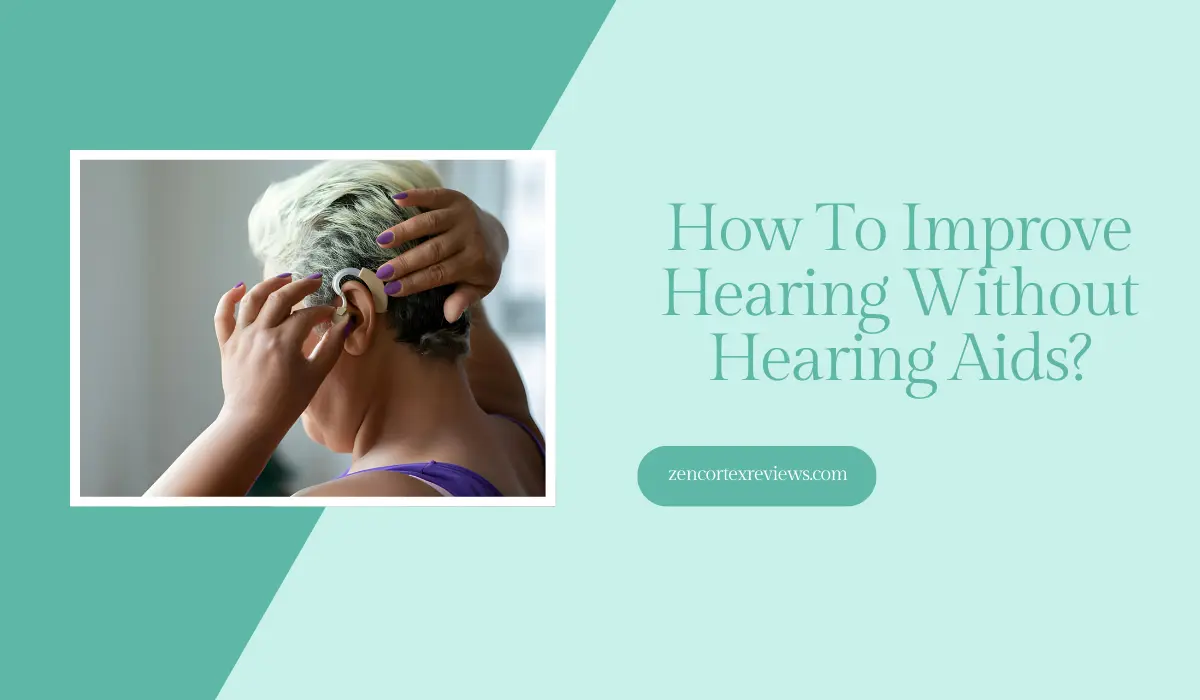How To Improve Hearing Without Hearing Aids: 7 Natural Strategies That Work
Find out the effective natural strategies to enhance your hearing without relying on hearing aids. Explore our blog for 7 proven methods to improve your hearing health!

Disclaimer: Our recommendations are sincere, driven by the products’ benefits. When you buy through our links, we may earn a commission, backing our testing and development at no extra cost to you.
As we age, it’s common for our hearing to gradually decline. Millions of people around the world struggle with age-related hearing loss, also known as presbycusis. While hearing aids can be an effective solution, not everyone is comfortable with or able to afford them. The good news is various natural and lifestyle-based approaches can help improve hearing without the need for assistive devices.
In this article, we’ll explore several effective strategies to enhance your hearing ability and maintain the health of your ears.

1. Incorporate Protective Measures
One of the most important steps in preserving your hearing is to protect your ears from further damage. Exposure to loud noises, whether it’s from machinery, music, or other environmental sources, can exacerbate hearing loss over time. Make it a habit to wear high-quality noise-canceling headphones or earplugs when engaging in activities with high noise levels. This simple precaution can go a long way in preventing additional hearing deterioration.
2. Optimize Your Diet
The foods you eat can have a significant impact on your hearing health. Incorporating a diet rich in antioxidants, vitamins, and minerals can help support the delicate structures within the inner ear. Some key nutrients to focus on include:
| Nutrient | Benefit |
|---|---|
| Omega-3 fatty acids | Reduce inflammation and improve blood flow to the ears |
| Vitamins C and E | Protect the hair cells in the inner ear from damage |
| Magnesium | Maintain normal hearing function |
| Zinc | Support proper auditory nerve function |
Aim to include a variety of these nutrient-dense foods in your daily meals to nourish your ears from the inside out.
3. Quit Smoking and Reduce Alcohol Consumption
Smoking and excessive alcohol consumption have been linked to an increased risk of hearing loss. Tobacco smoke contains harmful chemicals that can damage the delicate structures within the ear, while alcohol can impair blood flow and contribute to inflammation. If you smoke, consider quitting, and limit your alcohol intake to support your overall hearing health.
4. Manage Underlying Health Conditions
Certain medical conditions can contribute to or exacerbate hearing loss. Conditions like diabetes, high blood pressure, and thyroid disorders can all impact hearing function. If you have any underlying health issues, work closely with your healthcare provider to manage them effectively. Proper treatment and control of these conditions may help prevent further hearing deterioration.
5. Incorporate Hearing-Boosting Supplements
While a balanced diet is essential, sometimes our bodies may need a little extra support. Certain supplements have been shown to help improve hearing or slow down the progression of age-related hearing loss. Some promising options include:
- Ginkgo biloba: This herb has antioxidant properties and can improve blood flow to the ears.
- Coenzyme Q10: This nutrient plays a role in supporting the health of the inner ear.
- N-acetylcysteine: This amino acid derivative can help protect the ears from noise-induced damage.
Always consult with your healthcare provider before starting any new supplement regimen, as they can ensure it’s safe and appropriate for your individual needs.
6. Engage in Regular Exercise
Maintaining an active lifestyle can have a positive impact on your hearing health. Regular physical activity helps improve blood circulation, which can deliver more oxygen and nutrients to the delicate structures within the ear. Additionally, exercise has been shown to reduce inflammation, which can contribute to deafness. Aim for at least 30 minutes of moderate exercise most days of the week to reap these benefits.
7. Stimulate Your Auditory System
Just like any other part of the body, the auditory system needs to be actively engaged and challenged to maintain optimal function. Engage in activities that stimulate your hearing, such as listening to music, participating in group conversations, or playing brain-training games that involve auditory processing. Challenging your ears can help keep them sharp and potentially slow down the progression of age-related hearing loss.
Final Result
Remember, the key to improving hearing without hearing aids is a multifaceted approach that addresses various aspects of your overall health and lifestyle. Implementing these strategies consistently can help you maintain your hearing ability and potentially even enhance it over time. If you notice a significant decline in your hearing or experience sudden changes, be sure to consult with a healthcare professional for a proper evaluation and personalized recommendations.
By taking proactive steps to protect and nourish your ears, you can take an active role in preserving your hearing health and enjoying a lifetime of clear, vibrant sound.
Lindsay Martinez
Lindsay Martinez, Au.D., is a licensed audiologist with over 10 years of experience in the field of hearing healthcare. She earned her Doctor of Audiology degree from the University of California, Los Angeles, and currently practices at Martinez Hearing Clinic, a leading audiology practice in the San Francisco Bay Area. As an expert in diagnosing and treating a wide range of hearing disorders, Dr. Martinez specializes in fitting advanced hearing aids and assistive listening devices. She is a fellow of the American Academy of Audiology and has published numerous peer-reviewed articles on topics such as noise-induced hearing loss and the latest innovations in hearing technology. Passionate about patient education, Dr. Martinez is committed to helping her patients improve their hearing and overall quality of life.
